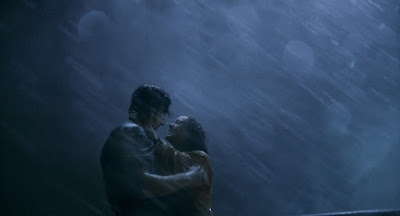That said, if the coup de foudre it presents us with lands far from La La Land's candy-coated homilies, Annette is nevertheless more familiar than anything to which the ever-outré Russell ever signed his name. Carax uses his vividly sketched characters to riff on a theme countless artists before him have wrestled with: how those who consider themselves uncompromising, devil-may-care bohemians, cutting-edge creatives, cope once they turn their hand to something as squarely normal, as thoroughly Everyman, as settling down and having kids. That's why the film keeps circling back to Henry's stand-up routines, to measure the impact having to care for another is having on an individual who appears a posterboy for solipsism. It's another extraordinary showcase for Driver, who uses the comedian's increasingly petulant bits to nudge the story along, spirals into murderous indifference, and then - come the emotive coda - expresses a regret and remorse that may be too little too late, depending on viewer mileage. (Henry makes Driver's driven Charlie in Marriage Story look entirely saintly, but I was surprised at how sympathetic I felt towards him. That's acting for you.) Admittedly, there's far less for Cotillard to do, beyond looking lovely, giving birth and then giving up the ghost, and even if that ghost is properly haunting - extending Carax's romanticism into another realm altogether - her presence as a vengeful spectre does position (and maybe damn) Annette as another work in which a woman has to die so as to make a man appear newly tragic and interesting. Henry is a dumb, self-loathing ox who doesn't realise what he's got until he mishandles it, and then it's gone. The movie hoisted onto his shoulders is a throwback in another sense: the work of (white) male artists writing about and working through what they themselves may have experienced in their own personal lives. Annette is dedicated to Nastya, the daughter Carax fathered with the late actress Yekaterina Golubeva, and even a cursory Wiki of the latter gives a sense of the tragedies that seem to inform this plot. (Nastya appears in the prologue, at Carax's shoulder: she has something of her mother's gravity about her, but otherwise - thankfully - appears safe and well.)
Here's where I take a leap of my own (and possibly fall flat on my face): dare I say only men could have got us here? (More modulated and less contentious: that only these men could have got us here.) Annette does succeed in grasping most of the Major Themes it's stood on its tiptoes reaching for; it's not just a heedless, headlong leap into the void. There's a brilliant number around the halfway mark - it's called "You Used to Laugh", although it's likely to be misremembered as "What's Your Fucking Problem?"; in any stage musical, it'd be placed at the start of the second half, to re-energise theatregoers - which considers how to respond as an artist when your audience is more clued-up and demanding than ever before. (One notes that Sparks are currently celebrating their 55th anniversary within a recording industry that looks and sounds nothing like it did in 1966.) And the central romantic tragedy benefits from a close, intense, built-in understanding of how damaging male pride, resentment and anger can be in any arena. What Carax appears to have learnt from the turbulence of the past decade - and it's something we all learn sooner or later - is that passion can be displaced, rerouted, perverted and sublimated (as with baby Annette, less a child in this framing than a work of art created by flawed human beings). That's what powers this decidedly full-throated, full-blooded movie. You can accuse Annette of many things: that it's wilful (what's with the port-wine scar that grows over the lower half of Driver's face in the second half?) or a flagrant attempt at self-exculpation (although the ending hardly lets Henry off the hook); that it's suicidally contrarian and terminally gloomy. The one criticism that just won't stick, however, would be that it's passionless, and it's that brio - that lust for messy, complex, imperfect life - which got me over any wobbles or missteps; furthermore, during the transcendent kitsch of baby Annette's stage debut, it pitched me up somewhere between the moon and the stars. With every other screen at your local Odeon a dead zone, how thrilling - and how moving - it is to witness a film so obviously conceived and embarked upon as art.
Annette is currently playing in selected cinemas, and will be available to stream on MUBI from November 26.

No comments:
Post a Comment